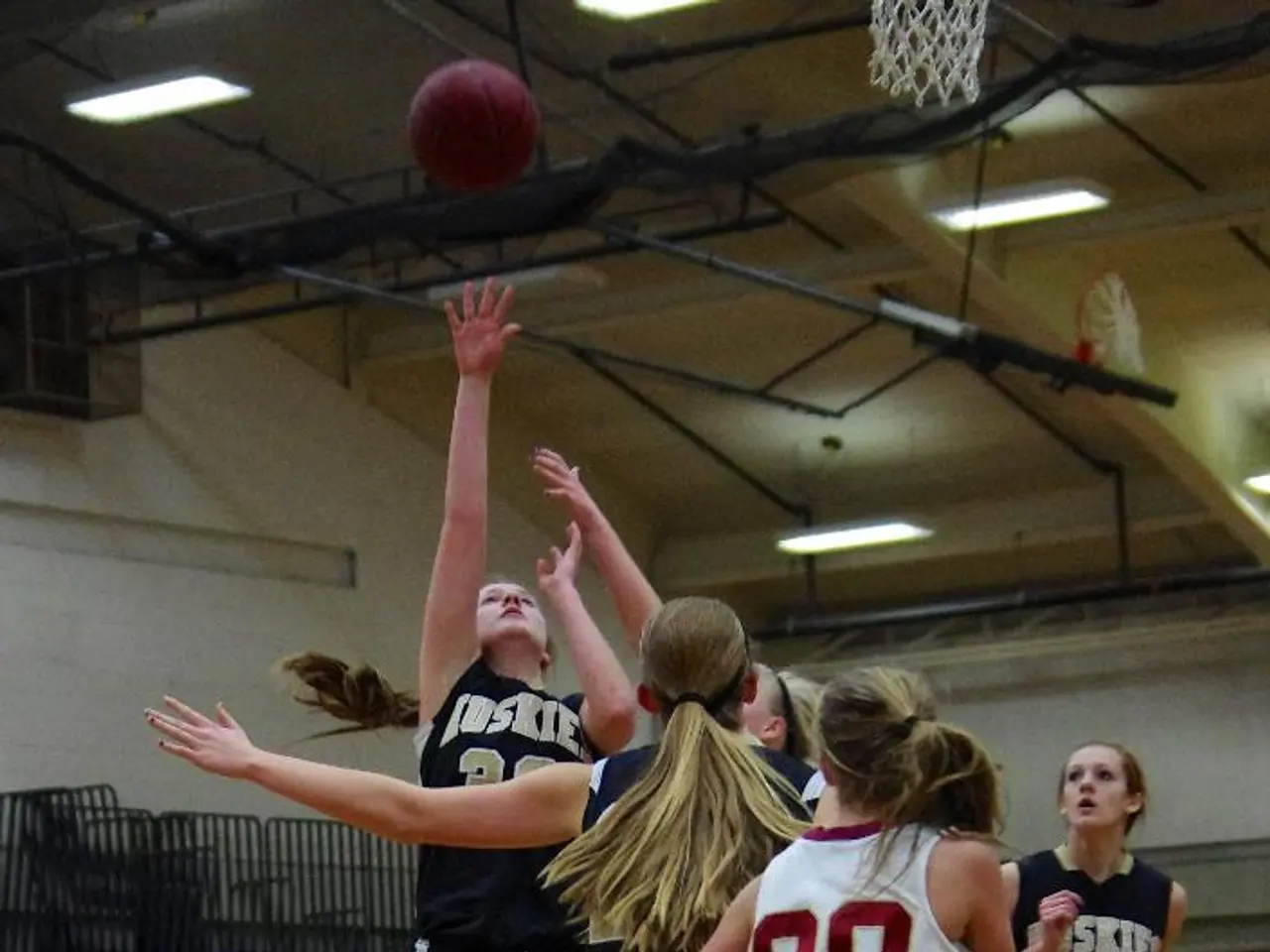WNBA athletes advocating for enhanced compensation as league experiences record growth
Headline: WNBA Players Demand a Bigger Piece of the League's Growing Pie: Here's Why
Sub-heading: As the Women's National Basketball Association (WNBA) booms, players challenge the system that left them far behind their NBA counterparts in pay and television revenue.
L.A. disputes: With crowds flocking to WNBA games, TV ratings skyrocketing, and the addition of the Golden State Valkyries, the league's monumental growth has put the spotlight on a thorny issue: the gender pay gap. WNBA players, backed by sky-high popularity and commercial potential, are clamoring for a larger share of the league's growing revenue, calling for parity with the NBA.
Time to rewrite the rules: The WNBA's recent $2.2 billion media rights deal, over 11 years, pales in comparison to the National Basketball Association's earth-shattering $76 billion package. With the Women's National Basketball Players Association (WNBPA) opting out of the collective bargaining agreement (CBA) two years ahead of schedule, it's clear that WNBA players won't rest until they get fair compensation.
Bringing their A-game: The WNBA players argue, "Men's sports have a revenue-based salary system – we deserve the same." They're standing firm on their aim to earn a share of the revenue they generate, pushing for the kind of fair treatment they deserve. In the current framework, WNBA players receive between 20 and 25 percent of basketball-related income, a far cry from the NBA's approximate 50 percent. WNBA salaries range from $66,000 to $250,000 annually, dwarfed by the NBA's average player earnings of around $11 million.
Leading the way: Nneka Ogwumike, president of the WNBPA, emphasizes that players understand the league's past and envision its future. They're determined to represent themselves and their value as they would on the court. The tension between broadcast revenue and player compensation is at the heart of the dispute, shedding light on a system that hasn't been working for the WNBA.
Media negotiation tug-of-war: As negotiations tighten, the NBA's 42% ownership stake – once a saving grace – is under scrutiny, as there's a concern that it may be holding the women's game back from realizing its full economic potential. Jane McManus, a New York University professor and women's sports commentator, observes, "Negotiations of media rights are incredibly important. That's why I think the WNBA players pulled out of the CBA early, because they felt they had not been maximizing revenue."
Taking matters into their own hands: With the current agreement expiring after the 2025 season, some players are exploring alternative ways to boost their earnings. Breanna Stewart and Napheesa Collier launched Unrivaled, an off-season three-on-three league offering salaries averaging $222,000 – a figure exceeding that of many WNBA players. Chicago Sky forward Angel Reese hinted at more drastic measures, implying that if the league doesn't meet player demands, a potential season-long standoff might be on the horizon.
Setting the stage for the next chapter: Although confrontations over compensation remain a pressing issue, Risa Isard, a women's sports researcher, sees promise in the upcoming negotiations. "Talks have been held about a more comprehensive pension package, solidifying charter flight agreements, and increasing support for players with children," she said. "I hope that this CBA will lay the foundation for the next chapter."
Going beyond revenue: Despite the tensions, Nneka Ogwumike remains optimistic about the negotiations. "Everyone wants to go to the same place," she said. "Everyone just has a different idea of how we get there. But it definitely starts with valuing the players in a way that makes sense for what we're doing out here, and also makes sense for the people that follow us and the fans supporting us."
With the WNBA's current momentum, Ogwumike underscores the need for salaries to reflect the league's dynamic growth trajectory. "We've seen a lot of growth recently," she said. "So we have to see that reflected in how we're compensated."
As the WNBA continues to shatter records, the battle for fair pay has never been more urgent. Players refuse to settle for less, fighting to ensure their economic contributions are properly recognized and rewarded. The future may hold new collectively bargained agreements that challenge and redefine traditional revenue-sharing models across sports leagues.
[1] Mayor, T. (2022, July 20). From the Injury that Stopped a Royal’s Fast Rise to the NBA to Healing in the WNBA. The New York Times. https://www.nytimes.com/2022/07/20/sports/basketball/cody-martin-wildcats-wnba.html
[2] Bontemps, J. (2021, August 8). WNBA strike puts pressure on league and players’ union to find a way forward. ESPN. https://www.espn.com/wnba/story/_/id/32073938/wnba-strike-puts-pressure-league-player-union-find-way-forward
- The demand for a bigger share of the WNBA's growing revenue by players aligns with salary systems in male-dominated sports, highlighting the need for parity in personal-finance opportunities.
- Leadership within the WNBPA, such as Nneka Ogwumike, aims to champion diversity-and-inclusion by ensuring fair treatment for players, a stance that has sparked tension in the area of budgeting, particularly as it relates to television revenue and salaries.
- In the business world, the WNBA's recent media rights deal represents just a fraction of the NBA's earnings, positioning the league's growth and future potential as key points of discussion in sports-analysis and finance conversations.
- As the spotlight intensifies on the WNBA, with basketball greats like Breanna Stewart and Napheesa Collier exploring alternative career avenues like the off-season Unrivaled league, the focus on personal-finance and fair compensation extends beyond the sports arena.
- The combination of sports fandom and finance expertise lends credibility to voices calling for gender equality in the WNBA, as stakeholders push for systemic changes that balance the scales and propel both men's and women's basketball into prosperous futures.




